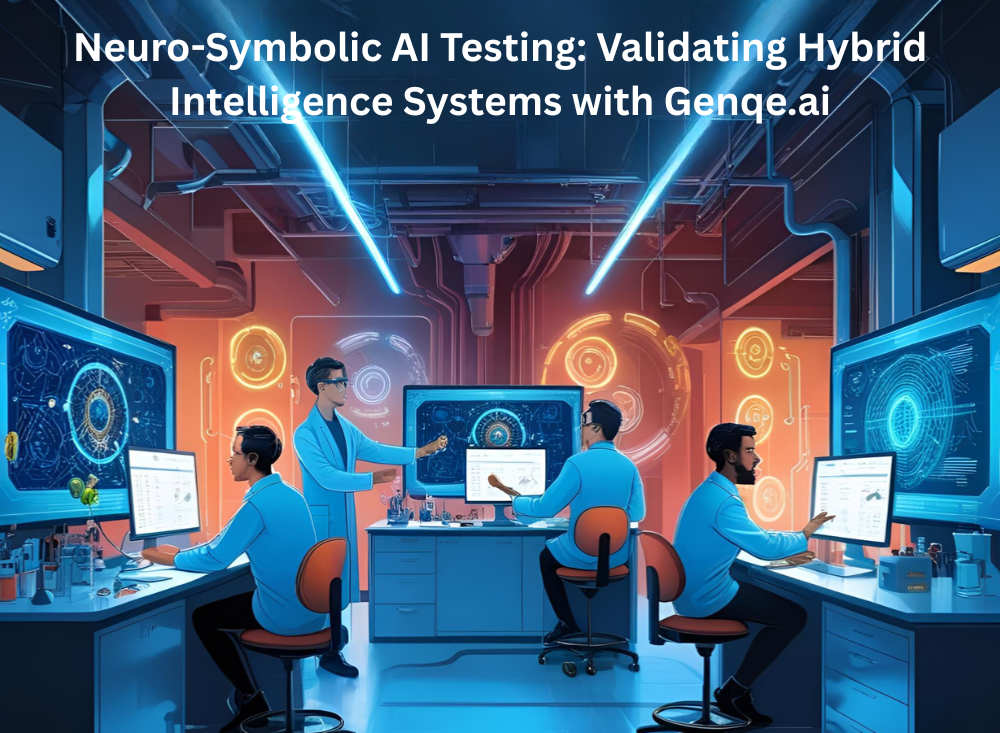
Artificial intelligence has evolved rapidly from purely statistical models to more nuanced, hybrid systems that combine neural networks and symbolic reasoning. This emerging paradigm, known as neuro-symbolic AI, merges the intuitive pattern recognition of neural networks with the logic-driven precision of symbolic systems. While the fusion promises smarter, more explainable AI, it also introduces a whole new layer of testing complexity.
To ensure reliability, trustworthiness, and accuracy in these hybrid systems, organizations need modern testing platforms built for neuro-symbolic AI. Enter Genqe.ai, a next-generation AI testing solution uniquely equipped to validate this hybrid intelligence architecture at scale.
The Rise of Neuro-Symbolic AI
Neuro-symbolic AI is quickly becoming the foundation of intelligent applications that require both deep perception and logical reasoning. Whether it’s a healthcare diagnosis system interpreting imaging data and following medical protocols, or an autonomous vehicle making ethical decisions based on road rules and sensor input, neuro-symbolic AI allows machines to “think” more like humans — blending experience with reasoning.
This makes the stakes higher when testing these systems. A failure in the neural component could mean misinterpretation of raw data, while a flaw in the symbolic layer could cause errors in reasoning or decision-making. Even worse, misalignment between the two can create unpredictable outcomes.
Why Neuro-Symbolic Systems Are Hard to Test
Traditional AI testing methods focus on either statistical performance (like precision/recall) or logic verification. But neuro-symbolic systems require validation across multiple dimensions:
- Accuracy of neural outputs (e.g., classification, perception)
- Correctness of symbolic rules or reasoning chains
- Interoperability between subsystems
- Robustness across edge cases and exceptions
- Explainability of end-to-end decisions
Testing needs to go beyond code and datasets — it must simulate real-world reasoning scenarios, monitor how the neural and symbolic components interact, and ensure they produce coherent, trustworthy outcomes.
Genqe.ai: Designed for the Complexity of Hybrid AI
Genqe.ai rises to meet this challenge with an AI-first approach to software testing. It brings automation, insight, and scalability to the validation of neuro-symbolic AI systems, making it easier for teams to build trustworthy intelligence into their applications.
Here’s how Genqe.ai specifically supports testing for neuro-symbolic AI:
1. Multi-Layer Test Scenario Generation
Genqe.ai’s AI-driven engine intelligently analyzes both the neural inputs and symbolic logic rules to generate comprehensive test scenarios. Whether it’s testing visual recognition accuracy or rule-based decision paths, Genqe.ai can simulate both layers in tandem — capturing edge cases that are often missed by conventional testing.
2. Traceable End-to-End Validation
In neuro-symbolic AI, understanding how an output was generated is crucial. Genqe.ai allows teams to trace decision-making pathways across both components. This means testers can validate whether the neural output led to the right symbolic inference and vice versa — ensuring the full system behaves logically and fairly.
3. Dynamic Rule Verification and Learning Integration
Genqe.ai continuously evaluates symbolic rule sets as models evolve. If the neural network starts producing novel outputs not originally covered by symbolic logic, the platform detects mismatches and flags them for review. This helps maintain alignment as both parts of the system learn and adapt.
4. Bias and Fairness Auditing
Symbolic reasoning is often assumed to be inherently fair, but it’s only as unbiased as the rules provided. Genqe.ai conducts audits that consider both implicit neural bias and explicit symbolic misrepresentation — helping you spot systemic issues before they reach users.
5. Real-World Simulation with Synthetic Data
To fully test a neuro-symbolic system, you need to simulate real-world conditions. Genqe.ai generates synthetic test data covering diverse inputs and logic chains, ensuring the hybrid system is stress-tested under controlled, yet unpredictable, environments.
Why It Matters in 2025 and Beyond
In 2025, AI systems are expected to be not just functional, but also transparent, explainable, and ethical. Neuro-symbolic AI provides the architecture to meet these goals, but it cannot fulfill its promise without rigorous testing.
Genqe.ai plays a key role in this transformation by offering:
- Confidence in hybrid intelligence decisions
- Reduced time-to-market for complex AI applications
- Fewer bugs, logic flaws, and post-deployment surprises
- Audit-ready traceability for compliance and trust
Whether you’re building autonomous systems, AI advisors, or hybrid enterprise tools, Genqe.ai empowers teams to validate intelligence systems with precision and agility.
Conclusion
As neuro-symbolic AI takes center stage in the next generation of intelligent systems, software testing must evolve with it. Genqe.ai offers a purpose-built platform to test, validate, and monitor these hybrid systems — ensuring they work correctly, reason soundly, and earn user trust.
In the era of intelligent software, testing isn’t just a step — it’s the foundation of success. With Genqe.ai, you’re not just testing software. You’re validating intelligence.